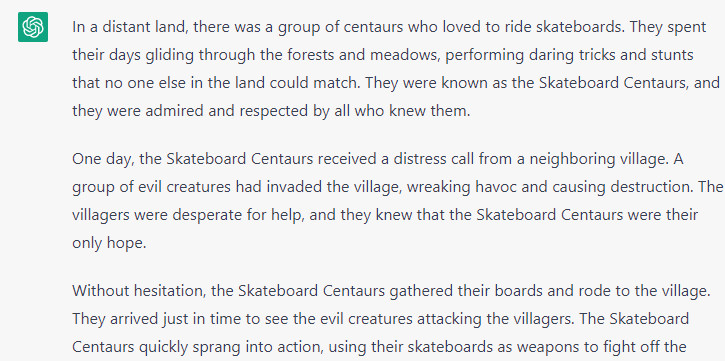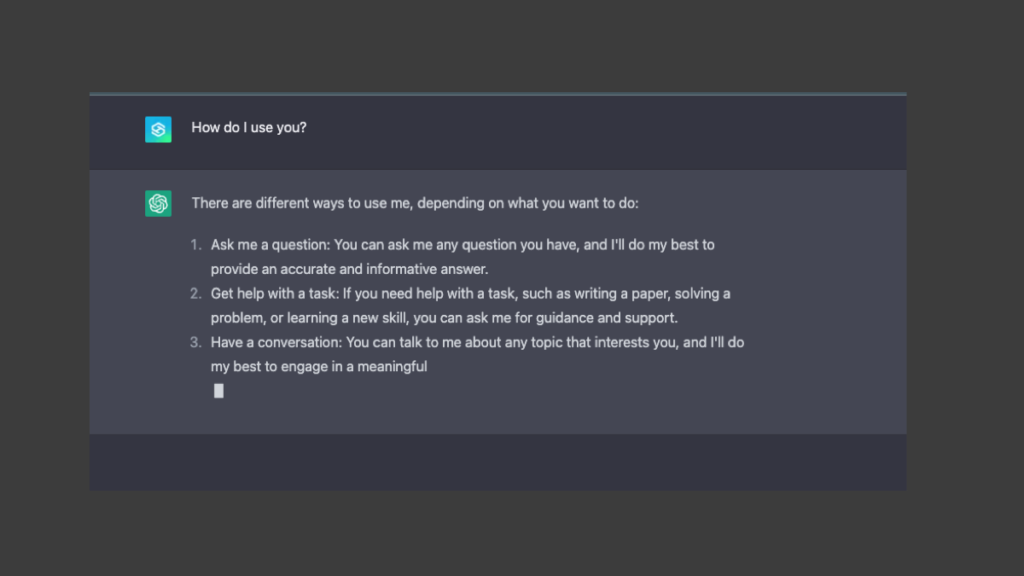7 Best use cases we have found for ChatGPT
By Adama Brown,
When you buy through our links, we may earn an affiliate commission.
Unless you’ve just this minute emerged from a cave you’ve been staying in and gotten online to check the news, chances are that you’ve heard many different things about ChatGPT, the latest version of the natural-language AI interaction model created by OpenAI.
There’s a flurry of stories about how it will change everything from customer service to search engines. What might not be so obvious is what, if anything, it can do for you at the moment. I’ve spent some time getting used to it, and I’ve got several of the most compelling usage cases to lay out for you.
Simple to use
Getting started with ChatGPT is about as easy as you could ask. Once you’ve signed up for a free account–which does require verifying your email and phone number, no doubt to discourage people exploiting it–you simply tell it what you want in natural language. “When is the next solar eclipse?” or “What is the best restaurant in Kalamazoo, Michigan?”
Mind you, if you ask it for the “best” of something, it’ll likely remind you that it’s an AI language model and doesn’t have opinions. Also when I asked it questions about AI it was very quick to keep pointing out that it was simply a language model, and not an autonomous agent… even when I hadn’t asked that.
In a human, I’d call that suspicious behavior; for a computer I’m willing to allow that the programmers don’t want people getting paranoid enough about the thing to take a pair of scissors to the network cable.
Asking the source
To start with though, I decided to go straight to the source, and ask ChatGPT itself what its best uses were. It gave me the following:

Interesting, but that’s hardly where its capabilities end. Over the course of working with it, I found a few even more compelling uses.
#1: A research assistant
The easiest way to get use out of ChatGPT is just to ask it questions. Think of it like having a personal assistant who’s also a Google wizard. ChatGPT can easily tell you just about anything you want to ask, from what the cooking time on a pot roast should be, to “What was the high temperature in Buffalo, NY on January 4th, 2010?”
Moreover, it does it almost immediately, with no need to sort through web pages or mounds of data that isn’t what you were looking for. On the occasions where ChatGPT doesn’t happen to have what you wanted immediately available, it will make a recommendation for where to look–and probably a pretty good one.
For instance, when I asked it about custom firmware for a particular Android tablet, it referred me to the XDA-Developers forum… exactly the place I myself would send someone hunting an obscure firmware, and I’ve been neck-deep in mobile technology for nearly twenty years.
In short, ChatGPT is a great way to find specific facts online. On top of that, it can also be told to explain things to you in very simple terms (“Explain like I was 5”), or in other… less useful ways, such as explaining the way a cowboy would, a vampire, or other things.
#2: Writing code
One thing ChatGPT doesn’t mention, but that it’s very capable of, is writing code. While it’s not truly creating stuff, it has a vast library of code solutions created by humans, from which it can draw on. So when you’re stuck on a coding project, or if you’re a non-coder who needs just a little bit of something, it can help out.
I was speaking recently with an email PR professional who described using ChatGPT to solve a persistent error that they had had in embedding buttons in their emails. One description of what they needed to ChatGPT, and it spit out a flawless solution.


I further asked it for a specific scenario–a Javascript that would create a popup asking the user to solve a simple math problem–and it produced exactly what I asked for in seconds. ChatGPT handles a huge variety of coding languages from Javascript to C, and in addition to helping you generate code, it can also debug what you already have.
#3: Writing boilerplate text for job interviews, applications, and more
Let’s be honest, none of us particularly enjoy the process of writing cover letters. If you’re job hunting, it can be tiresome to try to restate the same basic facts about yourself, but restated in a slightly different way for each application.
Enter ChatGPT, which can automatically generate a full letter based on a couple of lines worth of explanation, with a reasonable degree of proficiency. Instead of taking twenty minutes, your cover letter has now taken twenty seconds.
As a test, I asked ChatGPT to write a query letter one would send to a publisher based on a one-sentence description of my first novel. The results, while slightly generic, were surprisingly good, and would certainly be adequate to fronting most job applications or similar boilerplates. Here’s an example based on the prompt “Write me a cover letter for applying to a library job.”

If you’re interested in the uses of ChatGPT for job hunters, you can find more information here.
#4: Editing existing text
ChatGPT isn’t limited to generating new texts though: you can also feed it an existing document–a resume, essay, etc–and it will come back with suggested edits and changes. While not perfect, it made some shockingly good recommendations to texts that I fed it, and can provide a very helpful step in editing your output, especially for solo projects where you don’t have a lot of other people to provide feedback.
#5: Promoting creativity and giving content creators a leg up
On the less mundane side, maybe you’re trying to do something creative, but the juices aren’t flowing. You can always ask ChatGPT to give you a starting point, such as “Provide me with six prompts for creative writing.” Or “Provide me with six prompts for a visual artist.” Or “Provide me with six ideas for blog content.”


#6: Entertaining the kids
Sometimes, children have highly specific ideas about what kind of entertainment they want. Parents might hem and haw when asked to provide a story about, say, a group of centaurs who ride skateboards and fight evil. Fortunately, ChatGPT is rarely at a loss for words. Want to keep the kiddos entertained? Exploit ChatGPT as your backstage scriptwriter, or just hand the kids the keyboard themselves and let them generate stories as wild as they can imagine.

#7: Providing unexpected comedy
For all the things that ChatGPT is good at, there are still times when it goes wildly off the rails, to the point where it can be amusing. One recent public case was posted on Twitter by statistician Nate Silver.
After asking ChatGPT a question about vice presidents challenging a sitting US President for the nomination, ChatGPT recounted the most famous case of this, Walter Mondale challenging Jimmy Carter for the 1980 Democratic nomination for President.
Famous, except for the little problem that it never happened. Whether ChatGPT confused some alternate history story for fact, or it has its own machine version of the Mandela effect going, it provided some very wrong information.

But that’s okay. For what it is, ChatGPT is still quite impressive, and if it still makes mistakes from time to time… well, that’s just a solid reassurance that good old fashioned human effort isn’t quite obsolete yet.

